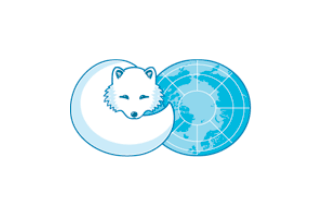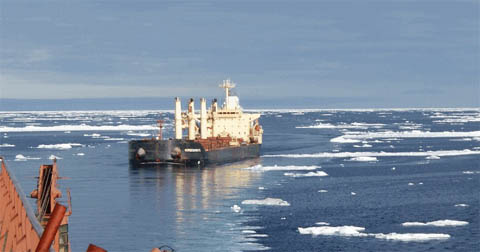|
|
|
|
|
|
|
|
Today's Congressional Action:
The House and Senate are not in session.
|
Media
 Arctic Yearbook 2016 Looks at Arctic Council in Its 20th Year. Arctic Yearbook 2016 Looks at Arctic Council in Its 20th Year. If you want to know more about the past, present and future of the Arctic Council, now in its 20th year, a new 400-plus-page online publication gives you plenty to think about. The Arctic Yearbook-an international effort-has been published annually since 2012 with the goal of providing critical analysis on Arctic politics, governance and security. In 2016, the Arctic Yearbook aims to offer "the most substantial evaluation of the Arctic Council ever published." Nunatsiaq Online
NASA Video Shows Rapid Decay of Arctic Ice. A time-lapse video released by NASA shows the rapid shrinking of the Arctic ice shelves over three decades, highlighting the catastrophic changes global warming is having on our environment. "What we've seen over the years is that the older ice is disappearing," Walt Meier, sea ice researcher at NASA's Goddard Space Flight Center, said in the October 29 video. "This older, thicker ice is like the bulwark of sea ice: a warm summer will melt all the young, thin ice away but it can't completely get rid of the older ice. But this older ice is becoming weaker because there's less of it and the remaining old ice is more broken up and thinner, so that bulwark is not as good as it used to be." 9 News  International Marine Org Moves on Key Arctic Shipping Issues. International Marine Org Moves on Key Arctic Shipping Issues.
Heavy fuel oil, the nasty, climate-warming polluting oil used in Arctic shipping may be phased out in the region by 2020. That's the promising news from International Maritime Organization, the United Nations agency with responsibility for the safety and security of shipping and the prevention of marine pollution, in London, after hearing from Arctic Indigenous representatives on the need to ban heavy fuel oil in the Arctic. Nunatsiaq Online US Authorities Prepare to File a Request to Extend Its Continental Shelf. American experts have compiled a map of 14,000 square kilometers of seabed in the Arctic to support the planned submission for extending the US continental shelf, Media Relations Specialist at US Coast Guard Katie Braynard told TASS when commenting on the results of a four-month Arctic expedition by the icebreaker US Coast Guard Cutter Healy, which ended in mid-October. Braynard said the expedition members used special equipment to map some 5,400 square miles (14,000 square km) of seabed between Dutch Harbor on Unalaska Island in the Aleutians and the town of Nome in Alaska. The equipment mounted on USCGC Healy was used to collect geomorphic data for determining the foot of [continental] slope (FOS). The Arctic Arctic Sea Creates Get Over the Winter Blues by Making Their Own Light.
In the polar winter darkness, 100ft below the surface of the Arctic sea, the water has been found to be alive with light and activity, adding to evidence that the polar underwater winter is nowhere near as dormant as previously thought. At this depth there is plenty of light but it's not from the sun: bioluminescent zooplankton light up the water instead. The depth of 100ft has been identified as a crucial zone for organisms that have evolved to glow, according to research published in Scientific Reports. International Business Times
|
Legislative Action.gif)
No Arctic legislation was formally considered yesterday.
|
|
Future Events
1st International Muskox Health Ecology Symposium, November 7-10, 2016 (Calgary, AB Canada). The goal of this symposium is to share knowledge on muskox health ecology and sustainability across a variety of international stakeholders including community members/users, industry, wildlife management, and academia. We will discuss: the values, ecological, economic, social and cultural, of muskoxen; population status and trends; threats, vulnerabilities and resilience or sustainability; knowledge gaps; disease ecology; and existing and new tools for muskox health monitoring and research. For more information, please contact Susan Kutz.
ArcticNet annual Scientific Meeting 2016, December 5-9, 2016 (Winnipeg, MP Canada). ArcticNet will host its 12th Annual Scientific Meeting. The ASM2016 will welcome researchers, students, Inuit, Northerners, policy makers and stakeholders to address the numerous environmental, social, economical and political challenges and opportunities that are emerging from climate change and modernization in the Arctic. As the largest annual Arctic research gathering held in Canada, ArcticNet's ASM is the ideal venue to showcase results from all fields of Arctic research, stimulate discussion and foster collaborations among those with a vested interest in the Arctic and its peoples.
American Geophysical Union Fall Meeting, December 12-16, 2016 (San Francisco, CA USA). Anticipating about 25,000 attendees, AGU's Fall Meeting will again be the largest Earth and space science meeting in the world. 2016 marks the meeting's 49th year and there will be approximately 20,000 oral and poster presentations in over 1,700 sessions, many of which will focus specifically on Arctic science. Among the highlights, the "2016 Arctic Report" will again be released, IARPC will hold a "Town Hall Meeting" on Thursday, Dec. 15th, from 12:30 to 1:30 pm in Moscone West Room 2003, and NASA will have a Town Hall on Operation IceBridge on Dec. 14th, in Moscone Room 202 from 12:30 to 1:30 pm.
Alaska Marine Science Symposium, January 23-27, 2017 (Anchorage, AK USA). The annual Alaska Marine Science Symposium (AMSS) is Alaska's premier marine research conference. It brings together roughly 800 scientists, educators, resource managers, students, and interested public to discuss marine research being conducted in Alaskan waters. Research will be presented by geographic theme, including the Gulf of Alaska, Bering Sea & Aleutian Islands, and the Arctic. Topic areas will include ocean physics, fishes and invertebrates, seabirds, marine mammals, local traditional knowledge and more. Keynote presentations will be held Monday, January 23rd; Gulf of Alaska presentations will be on Tuesday, Bering Sea/Aleutian Islands on Wednesday, followed by the Arctic on Thursday.
Alaska Forum on the Environment, February 6-10, 2017 (Anchorage, AK USA). This statewide gathering of environmental professionals, community leaders, Alaskan youth, conservationists, biologists and community elders will be holding its 19th meeting to continue providing a strong educational foundation for all Alaskans and a unique opportunity to interact with others on environmental issues and challenges. As many as 1,800 people are expected to attend AFE this years meeting.
6th Annual Fletcher Arctic Conference, February 17-18, 2017 (Medford, MA USA). Fletcher Arctic VI, a TEDx-style event, will showcase the ideas, stories, and initiatives of people who live and work in the Arctic. The conference will bring together inspiring leaders, innovative business people, expert scientists, and artists from the pan-Arctic region. Building on The Fletcher School's interdisciplinary approach, Fletcher Arctic VI will be a forum to engage in conversation and spark open and constructive debate between speakers and participants, providing deep insights into this unique and rapidly changing region.
IV International Forum, March 2017 (Arkhangelsk, Russian Federation) Arkhangelsk will host the Forum. The Forum will be titled Human in the Arctic and will be aimed at putting together joint efforts of the international community to promote effective development of the Arctic region as a territory for comfort life, work and leisure. The Forum will be attended by government officials, representatives of international organizations and prominent business communities, centers for political studies, Polar researchers and members of the international Arctic expeditions, foreign political scientists and economists, Russian and foreign journalists from leading international media organizations. The Forum will be attended by the President of the Russian Federation, Mr. Vladimir Putin. Additional information will be announced here.
Ninth International Congress of Arctic Social Sciences: People and Places (ICASS IX), June 8-12, 2017 (Umeå, Sweden).ICASS IX's theme is People & Place. Research on social sciences and humanities have a great responsibility to address the challenges for sustainable development in the Arctic, with a specific focus on the many different parts of the Arctic and the people that live there. The multiple Arctics have lately been addressed by many policy makers and researchers. The purpose is often to counteract the stereotypic understanding of the Arctic too often represented by icebergs and polar bears. A focus on people and place highlights the many variances across the region in terms of climate, political systems, demography, infrastructure, history, languages, legal systems, land and water resources etc.
POLAR 2018, June 15-27, 2018 (Davos, Switzerland). POLAR2018 is a joint event from the Scientific Committee on Antarctic Research (SCAR) and the International Arctic Science Committee (IASC). The SCAR meetings, the ASSW and the Open Science Conference will be hosted by the Swiss Federal Institute for Forest, Snow and Landscape Research WSL under the patronage of the Swiss Committee on Polar and High Altitude Research. The WSL Institute for Snow and Avalanche Research SLF is organizing POLAR2018.
|
|

  
4350 N. Fairfax Drive, Suite 510
Arlington, VA 22203, USA
External links in this publication, and on the USARC's World Wide Web site ( www.arctic.gov) do not constitute endorsement by the US Arctic Research Commission of external Web sites or the information, products or services contained therein. For other than authorized activities, the USARC does not exercise any editorial control over the information you may find at these locations. These links are provided consistent with the stated purpose of this newsletter and the USARC Web site.
|
|
|
|
|
|
|
|
|